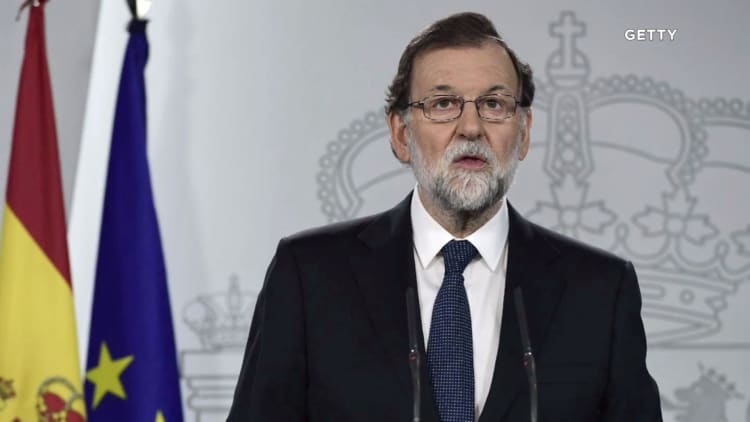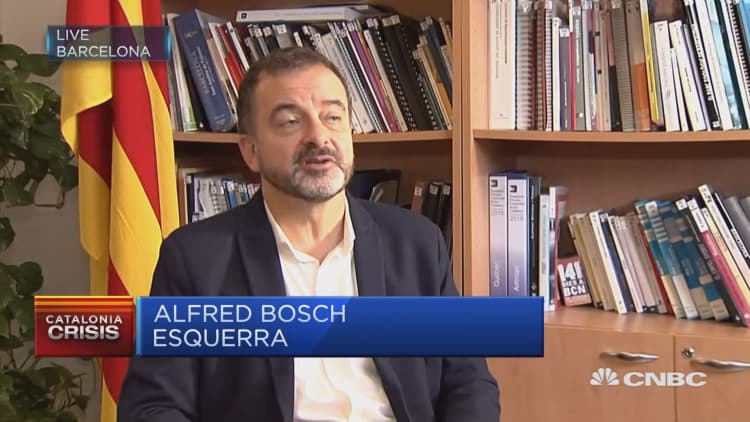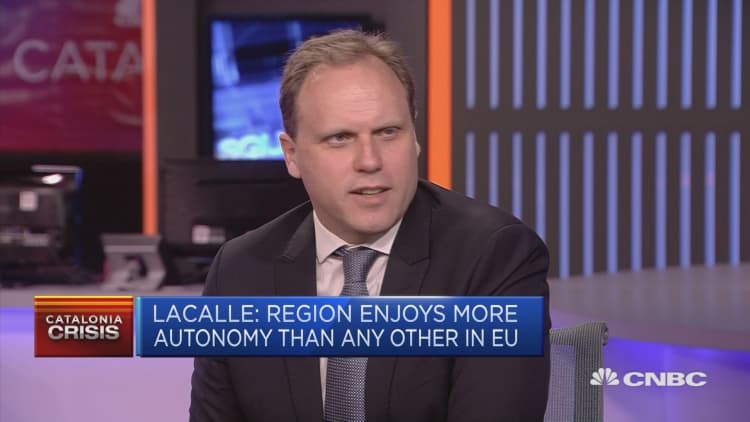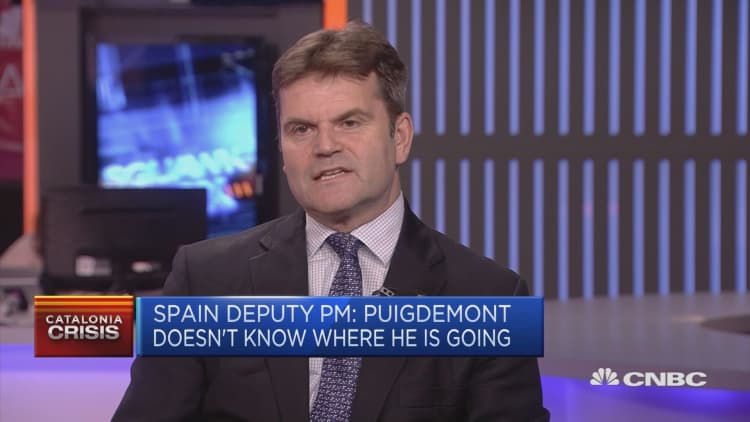
The game of cat and mouse between Spain and Catalonia continued Wednesday with Spain's prime minister demanding clarity from the Catalan government over whether it has actually declared independence or not.
Spanish Prime Minister Mariano Rajoy said in a televised address Wednesday morning that he required clarity on the matter "before any other measure that could be taken under Article 155 of the constitution" hinting at using the so-called "nuclear option" in the Spanish government's arsenal.
Article 155 would effectively see Rajoy sacking the Catalan government and prompting fresh regional elections.
Catalonia's leader made an ambiguous statement on Tuesday in which he signed a declaration of independence but asked the Catalan parliament to suspend the results of the disputed referendum vote on October 1, calling for dialogue with Spain. The statement had effectively put the ball in the Spanish government's court over what would happen next in the political impasse.
But Rajoy's response on Wednesday forces Catalonia's leadership to be clear on its position and intentions.
Amid the current war of words, the crisis has been stalled rather than resolved, strategists noted.
In a widely-anticipated speech, Catalan President Carles Puigdemont told the regional parliament that the people of Catalonia had won the right to independence following the symbolic referendum vote on October 1.
However, he asked the regional parliament to suspend the majority "yes" vote in favor of independence and called for dialogue with the Spanish government, adding that the current relationship between Catalonia and the Spanish government was unsustainable.
The Spanish parliament is now expected to discuss the Catalonia crisis on Wednesday afternoon and there is speculation over how it will respond to Puigdemont's call for dialogue, having previously said it would only talk when the Catalan government adhered to the rule of law and order.
Spanish Prime Minister Mariano Rajoy has not made a public statement following Puigdemont's address, but Deputy Prime Minister Soraya Saenz de Santamaria responded to the separatist leader's statement by saying that "neither Mr. Puigdemont nor anybody else can claim... to impose mediation. Any dialogue between democrats has to take place within the law."
Rajoy is expected to address parliament Wednesday afternoon, an address that will be closely watched to see how he and the Spanish government will respond to Catalonia.
Following the unofficial independence referendum on October 1, in which 90 percent of Catalans voted for independence for Spain, although turnout was low, tensions have risen between the national and regional governments and several large Catalan businesses have said they would relocate out of Catalonia in the face of uncertainty.
'Clever move'
Although Puigdemont's decision to stop short of any formal declaration of independence has disappointed the most ardent supporters of secession among the public and political establishment in Catalonia, one politician in the pro-independence Republican Left Party of Catalonia party (Esquerra Republicana de Catalunya, or ERC) told CNBC that Puigdemont's move was "clever."
"In a way it gives some air to this process, it enables us to open dialogue with the Spanish government and also with the international community," Alfred Bosch, a senior Esquerra politician told CNBC on Wednesday. "We must give a chance to everybody to realize how we are open to solutions to the Catalan question."

Bosch, who is also an Esquerra city council leader in Barcelona, said that the only red line for separatists was "democracy."
"The people have to decide and it's up to them to decide whether we are independent or not. We had a vote on October 1 and for us that's a binding vote and we had to declare independence, but we've suspended it to see if we can solve it some other way but always relating to democracy," he said.
More autonomy?
Ahead of Puigdemont's speech, there had been rising expectations that Madrid could invoke Article 155 of Spain's constitution (a so-called "nuclear option") that would allow it to sack the regional government and call a new election — and the possibility remains that Spain could seek to do this. But experts believe that Spain should now grant Catalonia more autonomy, not less.
The wealthy northeast region of the country already has a large degree of self-government, controlling matters of culture and regional commerce, health and justice. It also has its own police force, the Mossos d'Esquadra.
Yet it does not have complete control over taxation (the redistribution of a large chunk of its tax revenues to the rest of Spain is a bone of contention) and central government maintains powers over foreign and economic policy, as well as immigration and defense.
Daniel Lacalle, chief economist and investment officer at Tressis Gestion, told CNBC that Catalonia needs more autonomy now.
"Companies, economic agents and people that want Catalonia to do better know that secession is a very negative economic event both for Spain and for Catalonia, so what I want is for them to have more autonomy, not less autonomy," he said, adding that the independence movement was not about freedom.

"Everyone talks about this secession as if it's about freedom, but they (Catalan separatists) want to be in the European Union, they want to be within the same structures that Brussels is imposing," he said.
"The point here is that taxation and administration has to be closer to the voter, closer to the citizens and that's why we have an autonomous region system in Spain that is unequalled in terms of the level of autonomy and the level of power that regional governments have, but that can be improved and that's where we need to get to."
Market jitters
European financial markets were relieved, opening higher Wednesday. Spain's IBEX opened 1.5 percent higher as the immediate threat of independence had been removed.
Nonetheless, the political risk from Catalonia remains, according to Jeremy Stretch, head of G10 FX Strategy at CIBC Capital Markets, who said that markets had shown how they could react when Puigdemont was giving his address Tuesday.

"When Mr Puigdemont was reading his speech last night and it looked like at one point as though he was moving towards declaring independence, the euro did start to drift lower and we did start to see a flight to safety in the bund futures (German government bonds)," Stretch told CNBC on Tuesday. "So it does underline that there is an underlying uncertainty regarding the European project because of Catalonia."
"If there were to be any further signs of uncertainty then that would create instability and that would feed on itself (in markets)," Stretch added.


